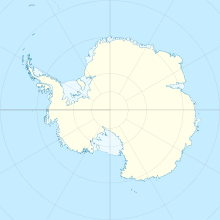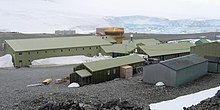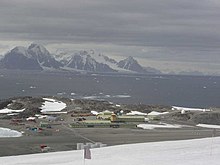Rothera station
Coordinates: 67 ° 34 ′ 0 ″ S , 68 ° 8 ′ 0 ″ W.
The Rothera Station is a research station of the British Antarctic Survey (BAS) on the Antarctic Peninsula offshore, Adelaide Island at the Marguerite Bay . It is used for biological , geological and glacial research in the region and as a supply base for the stations in the interior of the mainland.
Location and infrastructure
The station is located on the headland of Rothera Point on Ryder Bay in the southeast of the Adelaide Island off the Antarctic Peninsula . It forms the logistical backbone of the British Antarctic stations and is accordingly well equipped. In addition to a landing stage for supply ships, there is a 900 m long runway. The complete equipment with a tank system and a hangar enables reliable flight operations between the station and the Falkland Islands in the Antarctic summer months .
history
The Rothera station replaced the Adelaide station (1961-1977) in 1975, the runway slowly deteriorating. In the 1991/92 season the airfield was completely rebuilt. Until then, the transport aircraft had to use a runway 300 m away. Another milestone in the history of the station was the construction of the Bonn laboratory in 1996/97, which offered biologists completely new possibilities. It was now possible to undertake research dives and carry out experiments all year round. In winter 2001 a short circuit caused a fire in the laboratory. Nobody was injured, but the building burned down completely. It was rebuilt in the summer of 2003.
Todays use
Today the station with its modern equipment can accommodate up to 130 researchers in summer. In winter the number of inhabitants drops to 22. A variety of researches are carried out around the Antarctic Peninsula. The main focus is on biological, geological and meteorological issues. In the summer months, there are also multi-day snowmobile tours in the surrounding regions.
Others
On July 22, 2003, British scientist Kirsty Brown of the British Antarctic Survey was attacked and killed by a leopard seal while snorkeling near the Rothera research station . This is the only known death from a leopard seal.
The station caused a sensation through the participation of the house band Nunatak, which consists of young scientists, in the worldwide benefit concert series Live Earth on July 7, 2007 via recording.
Web links
- BAS page about Rothera including webcam (English)
Individual evidence
- ↑ James Owen: Leopard Seal Kills Scientist in Antarctica. In: NationalGeographic.com. August 6, 2003, accessed December 10, 2007 .


